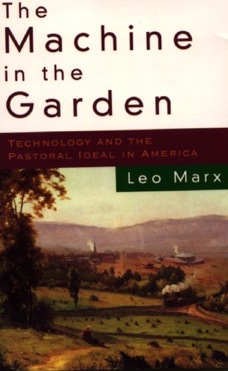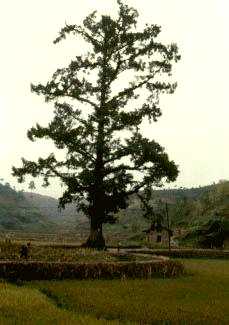 "Artists are the
antennae of the race."
"Artists are the
antennae of the race."
Ezra
Pound
p. 371.
Discussion
Notes:

"Moby Dick is neither
good nor evil,"
p. 317.
"the machine-in-the-landscape
trope"
p.
374.
"Let your life be
a counter-friction to stop the machine."
Henry
David Thoreau, Civil Disobedience, 1849.


- Sleepy Hollow
- The Tempest as the model
- The Garden
- The Machine
- Two Kingdoms of Force
- Epilogue
- Afterword
Sleepy
Hollow
I "Soon the dream of
a retreat to an oasis of harmony and joy was removed from its traditional literary
context. . . Embodied in various utopian schemes...in essence political-the
ideal has figured in the American view of life..." (p.3)
Shakespeare's
American Fable
II Fabled Tempest "a highly civilized European who finds himself
living in a prehistoric wilderness." (35)
The
Garden
III "the idea that the American continent may become the site of a new
golden age could be taken seriously in politics." (74)
The
Machine
IV "technology somehow is a match for the power of intellect implies a
progressive idea of history." (146)
Two
Kingdoms of Force
V "a regeneration in the New World. They become new, better, happier .
. . " (228)
Epilogue:
The Garden of Ashes
VI "Ours is an intricately organized, urban, industrial, nuclear-armed society."
"the contradiction between
the rural myth and the technological fact." (354)
"The machine's sudden
entrance into the garden presents a problem that ultimately belongs not to art
but to politics." (365)
Context of Thoreau's politics

- I
"Soon the dream of a retreat to an oasis of harmony and joy was removed
from its traditional literary context. . . Embodied in various utopian schemes...in
essence political-the ideal has figured in the American view of life..."
(p.3)
- the sentimental
or simple pastoral retreat (5)
- "such little
events as may happen." Nathaniel Hawthorne in "Sleepy Hollow"
(11)
- commentary "
the decisive part played by the machine image. . . .Now tension replaces
repose:" (16)
- "By design
I refer to the larger structure of thought and feeling of which the ideal
is a part." (24)
- II
Fabled Tempest "a highly civilized European who finds himself
living in a prehistoric wilderness." (35)
- "visual images
of a virgin land" (36)
- "the effort
to reconcile conflicting attitudes toward the New World." (46-47)
- "we still
must cope with what now seems a paradox:..[paradise away from MIlan] "how
lush and lusty the grass looked" how green!" (57-59)
- III
"the idea that the American continent may become the site of a new golden
age could be taken seriously in politics." (74)
- Robert Beverley's
Virginia where "America as nature's garden, a new paradise of abundance."
(75)
- by 1785 the transformation
of pastoral retreat from literary trope to political ideal mixing the
primitive with the "doctrines of perfectibility and progress."
(88)
- "an American
rural scheme....How could rural America possibly hold off the forces alreadt
transforming the economy of Europe?" (116-117)
- IV
"technology somehow is a match for the power of intellect implies a progressive
idea of history." (146)
- "Jefferson's
passion for utilitarian improvement, gadgets, and labor saving devices
of all kinds...." led him to say of the steam engine "it is
'simple, great, and likely to have extensive consequences.' . . . so as
to supersed the use of water ponds.' . . . and in America fuel is abundant'."
(146-47)
- "a capable
spokesman of the nascent manufacturing interests" 1792 Report
on Manufactures (150-51)Tench Coxe
- "it came
out of Germany by way of England...Schiller's "degeneration of contemporary
culture." (169)
- by 1829 "a
profitable factory system was firmly established in New England; new roads
canals and cities were transforming the landscape," thirteen miles
of the Baltimore and Ohio Railroad "were under construction."
(180)
- "The image
of the machine had become a major symbol of value." between 1786
and 1831(190)
- As a sample
of the rhetoric of progress (193) The machine
and nature
- The machine
and history -- more or less a record of continual progress
(197)
- The machine
and mind -- "steam power. . .will upset the moral economy
of the world." (199)
- The machine
and America -- telegraph lines "lands now traversed in
perfect security by these frail wires." (203)
- Daniel Webster
and Northern railroad dedication:"one way of neutralizing the conflict
between the machine and the rural ideal." (209)
- V
"a regeneration in the New World. They become new, better, happier .
. . " (228)
- Emerson's "The
Young American, (2-7-1844) "sense of teh land as an economic and
political force with a transcendental theory of mind, he expounds . .
. the philosophy of romantic American pastoralism." (229-230)
- "Walden
begins with the hero's withdrawal from society in the direction of nature
. . . .that the experiment has been a success. (242-43)
- Hawthorne and
Melville match themig motif to a darker view of life than Thoreau's. .
. conveys a sense of the widening gap between the facts and ideals of
American life, but the implications are more onerous." (265)
- "No book
confirms the relevance of the pastoral design to American experience as
vividly as the Adventures of Huckleberry Finn (1884) . . . the sudden
incursion of the new power has the effect of shattering childhood trauma...a
pattern of contradiction so nearly absolute that the promised resolution
of comedy is unconvincing." (319)
- "about the
contradictions said to embody what is most distinctive in American thought."
"Culture . . .the form of its existence is struggle, or at least
debate--it is nothing if not a dialectic." (341-42)
- VI "Ours is an intricately
organized, urban, industrial, nuclear-armed society." "the
contradiction between the rural myth and the technological fact." (354)
- "images
of mankind in the grip of uncontrollable forces."
- Charles
Sheeler (1930) "No trace of untouched nature remains. Not a tree
or a blade of grass is in view." (355)
- 1925 F.
Scott Fitzgerald's The Great Gatsby Nick says "There was something
gorgeous about him." (356-359)
- "The
difference betwen Gatsby's point of view and Nick's illustrates the the
distincton, with which I began between sentimental and complex pastoralism
. . . . a symbolic repository of meaning and value." (363)
- "Like
Melville's Starbuck, Gatsby would let faith
oust fact."
- "the
industrial Naturmensch who is blind to the complexity of modern
civilization." He seldom "learns how destructive they (felicitous
pristine images) are when cherished in lieu of reality."
- "destroyed
by his inability to distinguish between dreams and facts" in that
" the fantasy of pleasure is checked by the facts of history."
(363)
- American writers
seldom, if ever, have designed satisfactory resolutions for their pastoral
fables. (364)
- "But the
inability of our writers to create a surrogate for the ideal of the middle
landscape can hardly be acocounted artistic failure"
- "the root
conflict of our culture."
- "To change
the situation we require new symbols of possibility, and although the
creation of those symbols is . . .in greater measure the responsibility
of society." (365)
Afterword,
He reveals the passage of his thinking as reflected in this work that began
as a 1949 dissertation from a Harvard education in the late 1930s (1937-41)
and a Naval enlistment during the 1941-45 war turned into a book in the1964.
p. 367

What is a paradigm?

"Artists are the
antennae of the race."

![]()
![]()
![]()